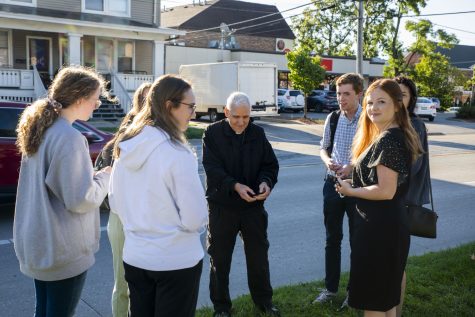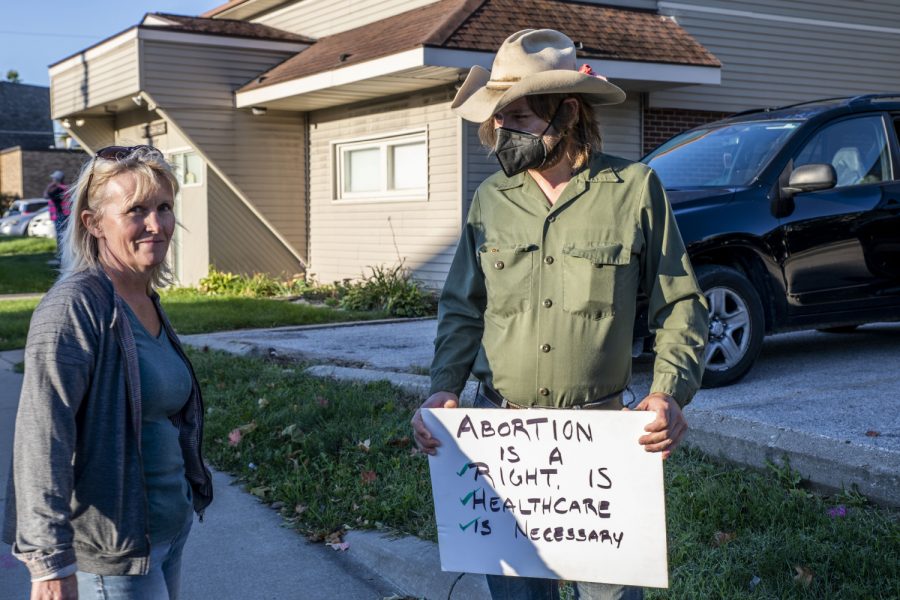Texas law has pro-choice activists in Iowa concerned
Following Texas’ near total abortion ban, Republicans in Iowa will focus on passing the proposed constitutional amendment regarding abortion in the 2022 session.
Gene Haighr speaks with Johnsons County Supervisor Jon Green outside the Emma Goldman Clinic on Thursday, Sept.9,.2021. Haighr questions Supervisor Green on his choices.
September 19, 2021
Pro-choice activists in Iowa are concerned that Iowa’s Legislature will introduce more restrictive bills that will block access to abortion in the state, after a near total ban on abortion in Texas was allowed to stand by the Supreme Court this month.
Francine Thompson, executive director of the Emma Goldman Clinic, an independent reproductive health clinic in Iowa City, said she has seen access to abortion decrease over her time with the clinic, while demand for the service has not.
Thompson said she is worried about the direction that abortion rights are moving in the Iowa Legislature. A proposed constitutional amendment that clarifies there is no right to an abortion in Iowa’s constitution has the potential to further restrict access, she said.
“I’m definitely concerned, there are a number of things that are on the horizon that could certainly impact a person’s ability to make the decision of whether or not to continue a pregnancy,” she said.
The Iowa House and Senate passed the amendment in May, which would nullify a 2018 Iowa Supreme Court decision that found the Iowa constitution protects the right to an abortion. This amendment now must pass in the Legislature by the end of the 2024 session and be approved by Iowa voters for adoption.
Rep. Bobby Kaufmann, R-Wilton, said he does not foresee any new abortion related legislation for the upcoming 2022 legislative session. He said he expects his party will focus on passing the amendment again.
“We voted for [the amendment] and I am confident it will pass again,” Kaufmann said. “It is now time for Iowans to decide what they want because it will be on the ballot in 2024.”
Limiting abortion access
Republicans in charge of state government in Texas passed a Heartbeat Act in May, which went into effect Sept. 1. The ban criminalizes abortions that are done after six weeks. The law also prevents civilians from aiding and abetting someone who is getting an abortion.
Iowa lawmakers have passed similar laws in recent years, curtailing abortions access. Chuck Hurley, vice president and chief counsel for The FAMiLY Leader, said he feels Iowans want the pro-life policies Republicans have been advancing.
“The Iowa Legislature has been advancing a culture of life in recent years, one that cares for both mother and child, but in 2018, the unelected judges of Iowa’s Supreme Court handed down an extremist decision that could force taxpayer funded abortion on all Iowans, and even permit abortion in Iowa up to the day of a baby’s birth,” Hurley said.

The topic of abortion, Hurley said, is so contested because of sonograms and people being able to see the fetus. He said having a picture of the fetus makes it easier to humanize it. Hurley compared the termination of pregnancies to human-rights abuses like the enslavement and oppression of Black people in America.
“It’s obviously the human rights issue of our time. You don’t have to go to a religious text. You just have to see an ultrasound,” Hurley said.
Republican Iowa Gov. Kim Reynolds signed a “fetal heartbeat” law in May 2018 that required a physician to do an abdominal ultrasound to test for a fetal heartbeat on anyone seeking an abortion. The abortion could not be performed if a heartbeat was detected.
Typically, heartbeats, or the sounds that come off as heartbeats, are detectable by the sixth week of gestation or the fourth week after conception.
The Iowa law was different than the Texas one, because Texas’ bill can be enforced and pursued by civilians who are aware of abortion procedures that are going on.
A Polk County District Court judge ruled the Iowa law unconstitutional by the following January — 46 years after the ruling of Roe v. Wade.
This month, 60 Iowa Republican legislators — including House and Senate leadership — signed a brief filed by conservative groups Alliance Defending Freedom and The Family Leader asking the court to overturn the 2018 decision.
Two decades after Roe, Casey v. Planned Parenthood was a follow up ruling that was decided on Jun 29, 1992, that upheld decision, but allowed states to restrict abortion if it does not create a burden on the person seeking it.
Gov. Kim Reynolds signed a bill amendment into law on June 29, 2020, exactly 28 years after the ruling of Casey v. Planned Parenthood. The Iowa law stated a physician performing an abortion must obtain written certification from the person seeking an abortion at least 24 hours prior to the procedure — but the law was blocked by a judge in June of this year, citing the 2018 ruling and a rule preventing lawmakers from attaching unrelated amendments to bills.
When Iowa’s fetal heartbeat bill was debated in 2018, floor manager Rep. Shannon Lundgren, R-Dubuque, said on the House floor that the bill, Senate File 359, was finally introduced because science and technology has improved significantly since the ruling of Roe v. Wade.
Lundgren said that physicians must draw the line for acceptance of life — a heartbeat.
“Today we are taking a courageous step, with the help of so many here in the House, to tell the nation that Iowa will defend its most vulnerable, those without a voice, our unborn children,” Lundgren said.
During the Family Leadership Summit in Des Moines, on July 16, 2021, Reynolds took the stage in support of limiting abortion access.
Reynolds said that most Iowans see abortion as the “termination of a precious life” and that they do not want tax dollars to go towards clinics that perform them.
While Reynolds said that Iowans want more abortion restrictions, a Des Moines Register/Mediacom Iowa Poll from March found that less than a third of respondents supported the proposed constitutional amendment that would specify that there is no right to an abortion in Iowa’s constitution. Support for the measure was at 31 percent, while 58 percent of respondents were opposed.
At the summit in July, the governor called her administration one of the most pro-life in the country. She pointed toward the pending constitutional amendment and the 24-hour wait limit. She said she can see more Iowa legislation in the future that she hopes will limit abortion access and that other states will follow.
“The power of informed patriotic Americans, bringing their faith, boldly into the public square, and seeking to influence government at all levels, cannot be overestimated,” Reynolds said.
Health ramifications
Nine months after Roe, the Emma Goldman Clinic opened its doors as the first in Iowa and its surrounding states to offer legal abortions.
Deborah Nye, one of the clinic’s founders, said that before — Roe v. Wade— she was a part of a group that would help people seeking abortions by referring them to clinics across the country that offered them.
Leading up to the Roe v. Wade ruling, six states and Washington, D.C. had already legalized abortion — some with exceptions and some without. Nye said she would help women get to clinics in these states.
“When people called, we would literally get them on a plane that morning and get them back that evening, so if somebody had to kind of keep it secret from a husband or parent, then, you know, we try to accommodate that and just get them in and out,” Nye said.
Nye said limiting access to abortion can drive people to unsafe or illegal methods.
“When you outlaw abortion, of course it doesn’t go away, it just becomes unsafe or, as was the case in my youth, it was the fourth largest income generator for organized crime,” Nye said.
Nye herself sought abortion services in high school before they were legal for her own unwanted pregnancy. She said she was fortunate to run into people who were willing to point her in the right direction.
Thompson said the Emma Goldman clinic sees about 700 people annually for abortions and about 1,000 for other reproductive health services. Independent clinics provide the vast majority of abortion procedures, she said, including those that are done for a pregnancy that is further along.
“We see clients that are sick, clients that are poor, clients that have the least access, and so for that reason, it gives folks an option of where to go for reproductive health care,” Thompson said.
According to the World Health Organization, 4.7 to 13.2 percent of maternal deaths worldwide are due to unsafe abortions annually.
The WHO’s fact sheet said abortions are safe when they are carried out with a method that is recommended and that is appropriate to the pregnancy duration, and when the person carrying out the abortion has the necessary skills.
Thompson said that the recent law that passed in Texas will harm people with low incomes and those in rural areas the most, because these are the people who are often forced to delay services to secure funds and transportation.
The law follows a similar wording as Iowa’s fetal heartbeat bill, because it criminalizes an abortion that is done after the detection of a heartbeat, as an ultrasound must be performed after any mention of an abortion.
The Texas law makes civilians liable for knowing about or aiding someone’s abortion. Thompson said this aspect of the law gives the public the ability to pursue and report what they believe to be an abortion, and subsequently consumes time and resources that could otherwise be used for quality health care services.
“The issue is really about whether or not a person wants to be a parent and continue in pregnancy, and the clinic really has a philosophy that folks should be able to make those very personal decisions on their own,” Thompson said.
Madelaine Todd, a University of Iowa graduate and Iowa City resident, has stood outside the Emma Goldman Clinic in favor of its services every Thursday since March.
Pro-life and pro-choice advocates regularly demonstrate outside the clinic every Thursday.
Todd said that people who consider abortion often consider other options first before terminating a pregnancy — the clients don’t make the decision on a whim.
“This is something I very firmly believe in, that people should have the choice to do, or have the option to do, whatever they want with their own bodies, Todd said. “People should have autonomy over their own uteruses, and all of their other organs.”
It’s not likely a person can know they are pregnant at six weeks, Todd said, because that is only two to four weeks after missing a period, and many people have irregular periods.
Todd said determining the viability of a life based on a heartbeat doesn’t make sense to her, because the fetal heartbeat is more of a movement of cardiac cells and noise from an ultrasound.
“I don’t know when life begins. I think I feel like it would begin when your body can support itself out of utero,” Todd said.
Todd said that Iowa could lose clinics like Emma Goldman, and while anti-abortion legislation is mostly a Republican priority, she feels Democrats have a tendency to sacrifice some legislative priorities to attempt bipartisanship.
“I feel like Democrats have a tendency to buy for this bipartisan, ‘Let’s keep the peace’ option rather than actually acting in their constituents’ wishes. So, in a sense, that does nothing but further this pro-life ideology, anti-abortion ideology,” Todd said.



